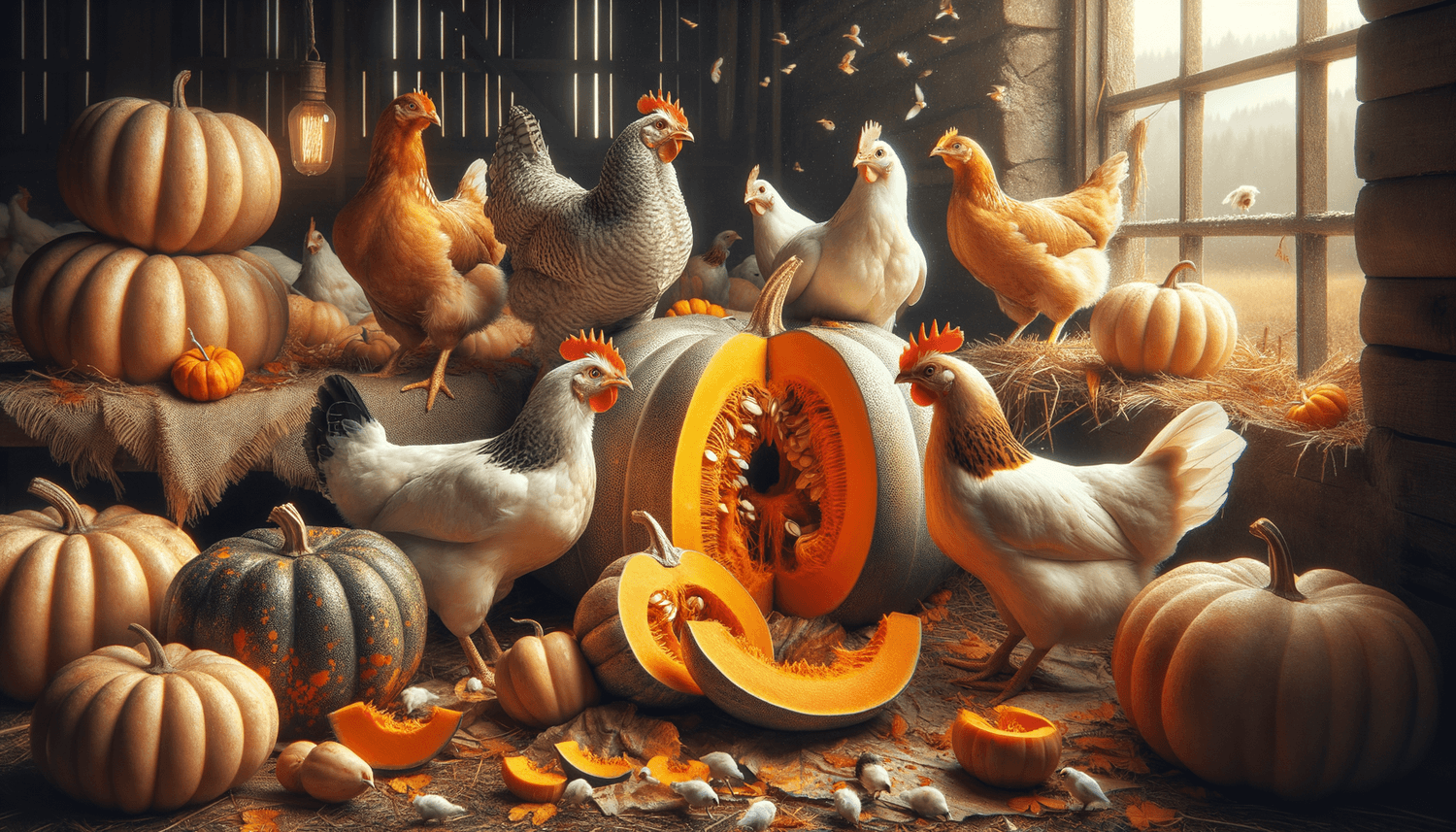Hey there, fellow chicken enthusiasts! 🐔 With fall in full swing and pumpkins popping up everywhere, you might be wondering if our clucky companions can share in the seasonal fun. Can chickens eat pumpkin? Do they even like it, and more importantly, is it good for them? Fret not, because you’ve stumbled upon the right place! In this whimsical yet informative blog post, we’ll explore everything pumpkin-related when it comes to feeding your backyard birds. We’ll be talking about a balanced diet, nutritional value, benefits and risks, and even some tips on how to prepare this iconic orange treat for your feathered friends!
Can chickens eat pumpkin?
Yes, chickens can absolutely eat pumpkin, and it is safe for them! In fact, pumpkins are a nutritious treat that can provide essential vitamins and minerals, such as vitamin A and C, potassium, and iron. Just remember to serve it in moderation, as a balanced diet is crucial for your chickens’ overall health.
A balanced diet for happy hens
Just like us humans, chickens thrive when they have a balanced diet. A chicken’s dietary needs can be complex, and providing the right balance of nutrients is essential for their overall health, growth, and egg production. The foundation of a chicken’s diet is high-quality chicken feed, which should make up around 80-90% of their daily intake.
Chicken feed is specifically designed to give your poultry pals all the essential nutrients they need for a strong, happy, and healthy life. This includes the perfect balance of protein, carbohydrates, fats, vitamins, and minerals. The remaining 10-20% of their diet can be filled with treats such as fruits and vegetables. These delicious extras not only add variety to their menu, but also provide additional nutrients and enrichment to keep your chickens entertained and content.
Nutritional value of pumpkin for chickens.
Feeding pumpkin to chickens indeed has notable nutritional value, as pumpkins are packed with essential vitamins and minerals that promote your feathered friends’ health. For starters, pumpkins are rich in vitamin A, which is crucial for their immune systems and maintaining good vision. Vitamin C is also present in pumpkins, and while chickens can produce it on their own, adding some through their diet supports their overall well-being.
Moreover, pumpkins contain essential minerals such as potassium and iron. Potassium supports healthy heart function, nerve transmission, and muscle contraction, while iron is necessary for oxygen transportation through the bloodstream. The seeds within the pumpkin are also beneficial, as they can act as a natural de-wormer for your chickens. Additionally, pumpkins have a high water content, which aids in keeping your chickens hydrated and their digestive systems running smoothly.
In summary, pumpkins are an excellent treat for chickens, offering multiple nutritional benefits without posing any risks when offered in moderation. Offering pumpkin to your flock is not only a delicious and enriching experience for them, but it also contributes to maintaining their good health and well-being.
Nutrition table of pumpkin for chickens.
| Information | Description |
|---|---|
| Nutritional Value | Rich in vitamins A and C, potassium, iron, and other essential nutrients. |
| Suggested Serving Size | Small portions served occasionally, making up no more than 10-20% of their diet. |
| Safe Feeding Practices | Offer in moderation alongside a balanced diet of high-quality chicken feed. |
| Preparation | Cut open the pumpkin, remove seeds for separate feeding, and cut flesh into small pieces. |
| Potential Risks | Minimal, as long as it’s fed in moderation and as part of a balanced diet. |
| Hydration | High water content helps keep chickens hydrated and supports digestion. |
| Digestion | Contains fiber which promotes healthy digestion and gut function. |
| Seasonal Availability | Most readily available during fall season but can often be found year-round. |
| Other Benefits | Pumpkin seeds can act as a natural de-wormer for chickens. |
Preparing pumpkin for your chickens
Now that you know pumpkins are a nutritious treat for your feathered friends, you might be wondering how to properly prepare them. It’s actually quite simple! Just follow these steps:
- Start by cutting the pumpkin open to expose the seeds and the flesh. You can chop the pumpkin into halves, quarters, or even smaller pieces depending on the size of your flock and how much you plan to feed them.
- Next, scoop out the seeds and set them aside. Remember, they’re useful too! You can give them as a treat on their own or mix them into their normal feed. Pumpkin seeds are a great natural de-wormer for chickens due to their cucurbitacin content.
- Before serving, cut the pumpkin flesh into small, manageable pieces that your chickens can easily peck and consume. You might need to experiment with this – some chickens may prefer smaller chunks, while others might enjoy a large piece to scratch at and explore.
- You can feed chickens both cooked and raw pumpkin. Be aware that cooking the pumpkin may diminish some of the vitamin content, so raw pumpkin is generally better. If you opt for cooked pumpkin, avoid adding any spices, sugar, or other additives.
Using pumpkin as a fun boredom-buster
Beyond their nutritional benefits, pumpkins can provide entertainment for your backyard flock. Chickens are naturally curious creatures and enjoy investigating and exploring new foods.
By giving your chickens a whole or halved pumpkin, they’ll have fun pecking at it and tearing it apart. This activity can help prevent boredom-related behaviors, such as feather-picking or aggression, leading to happier and more content chickens.
So, not only do pumpkins bring nutrition and hydration to the table, they also add an element of excitement and amusement, making them an ideal treat to spoil your backyard chickens with!

















